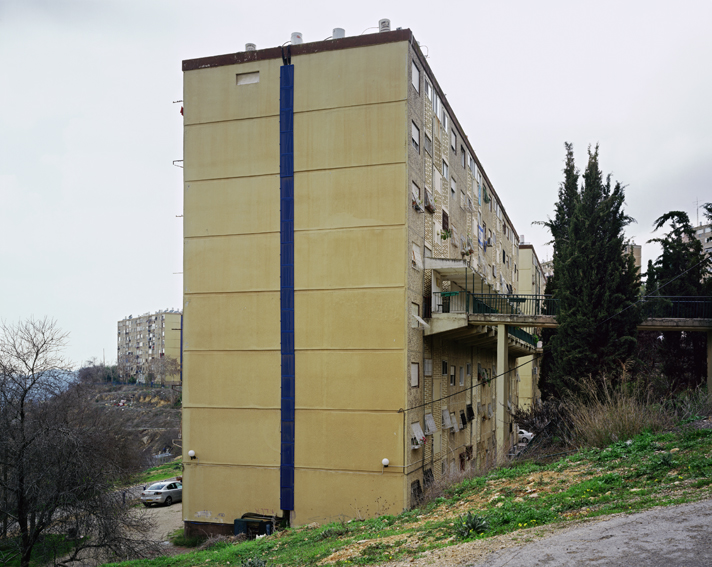Repair, do not demolish!
Location:
Year:
Artists:
Yaakov Israel
Credits:
Shelly Cohen and Haim Yacobi
Texts:
Public housing projects have been replaced in recent years by “Pinuy-Binuy” entrepreneurial projects (a Hebrew term for forcing all tenants out once a homeowner threshold is met, and then tearing down the building to rebuild on the site) or, in its laundered name, "Urban Renewal", focused on the economic logic of maximizing entrepreneurs' private profits. This approach has become the primary planning tool at present, and it expresses a philosophy that considers the built environment a "defective product", one that isn’t repairable but must be cleared, destroyed and rebuilt.
However, it should be kept in mind that the apartment block provides affordable housing for tenants from disadvantaged groups, including immigrants and the elderly. Apartment block architecture, of the type characterized by relatively low horizontal construction, has the potential for repair without destruction. It is possible to renovate existing buildings, and even to add to them, while taking into account existing infrastructure and open spaces, without giving up the urban fabric of the street and the connection between the building and its surroundings.“Pinuy-Binuy” projects, on the other hand, are characterized by a corporate architecture that reflects, amongst other things, the construction of towers (purportedly for denser inhabitation), that are very expensive for maintenance and detached from their surroundings. More, they exceed the carrying capacity of existing public infrastructure.
Massive construction projects aimed at satisfying the economic calculus will eventually completely displace the residents, among them homeowners and old people, as well as the public housing tenants who are usually presented as the people preventing the building of these new projects by refusing to leave. All of them will be “forced out” of the new projects that will be built in old city centers. They are the ones that will give way to the "right people" - a code name for established and hegemonic social strata.
In south-west Jerusalem neighborhoods, as in other cities in Israel, we need to move from the logic of “Pinuy-Binuy” to what we will call "Shikun-Tikun" (apartment block- repair); in other words, changing planning priorities and a return to the social foundations of housing. "Shikun-Tikun" means demanding that the state take active responsibility for providing shelter and for the residential environment, as against abandoning the urban space to the entrepreneurial interests of private capital. To a large extent, despite our criticism of the apartment block, it seems that social and architectural repair is the key to renewal and to the prosperity of cities and their residents.
Yaakov Israel
Shelly Cohen and Haim Yacobi
Public housing projects have been replaced in recent years by “Pinuy-Binuy” entrepreneurial projects (a Hebrew term for forcing all tenants out once a homeowner threshold is met, and then tearing down the building to rebuild on the site) or, in its laundered name, "Urban Renewal", focused on the economic logic of maximizing entrepreneurs' private profits. This approach has become the primary planning tool at present, and it expresses a philosophy that considers the built environment a "defective product", one that isn’t repairable but must be cleared, destroyed and rebuilt.
However, it should be kept in mind that the apartment block provides affordable housing for tenants from disadvantaged groups, including immigrants and the elderly. Apartment block architecture, of the type characterized by relatively low horizontal construction, has the potential for repair without destruction. It is possible to renovate existing buildings, and even to add to them, while taking into account existing infrastructure and open spaces, without giving up the urban fabric of the street and the connection between the building and its surroundings.“Pinuy-Binuy” projects, on the other hand, are characterized by a corporate architecture that reflects, amongst other things, the construction of towers (purportedly for denser inhabitation), that are very expensive for maintenance and detached from their surroundings. More, they exceed the carrying capacity of existing public infrastructure.
Massive construction projects aimed at satisfying the economic calculus will eventually completely displace the residents, among them homeowners and old people, as well as the public housing tenants who are usually presented as the people preventing the building of these new projects by refusing to leave. All of them will be “forced out” of the new projects that will be built in old city centers. They are the ones that will give way to the "right people" - a code name for established and hegemonic social strata.
In south-west Jerusalem neighborhoods, as in other cities in Israel, we need to move from the logic of “Pinuy-Binuy” to what we will call "Shikun-Tikun" (apartment block- repair); in other words, changing planning priorities and a return to the social foundations of housing. "Shikun-Tikun" means demanding that the state take active responsibility for providing shelter and for the residential environment, as against abandoning the urban space to the entrepreneurial interests of private capital. To a large extent, despite our criticism of the apartment block, it seems that social and architectural repair is the key to renewal and to the prosperity of cities and their residents.
